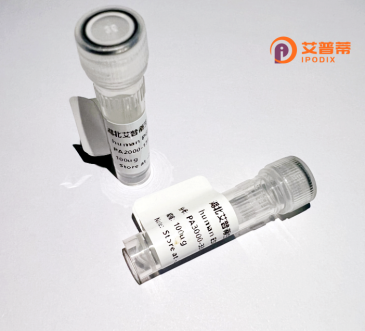
| 纯度 | >90%SDS-PAGE. |
| 种属 | Human |
| 靶点 | PSG4 |
| Uniprot No | Q00888 |
| 内毒素 | < 0.01EU/μg |
| 表达宿主 | E.coli |
| 表达区间 | 1-419 aa |
| 活性数据 | MGTLSAPPCTQRIKWKGLLLTASLLNFWNLPTTAQVTIEAEPTKVSEGKDVLLLVHNLPQNLTGYIWYKGQMRDLYHYITSYVVDGEIIIYGPAYGGRETAYSNASLLIQNVTREDAGSYTLHIIKGDDGTRGVTGRFTFTLHLETPKPSISSSNLNPRETMEAVSLTCDPETPDASYLWWMNGQSLPMTHSLKLSETNRTLFLLGVTKYTAGPYECEIRNPVSASRSDPVTLNLLPKLSKPYITINNLNPRENKDVLTFTCEPKSENYTYIWWLNGQSLPVSPRVKRPIENRILILPNVTRNETGPYQCEIRDRYGGIRSDPVTLNVLYGPDLPSIYPSFTYYRSGENLYLSCFAESNPRAQYSWTINGKFQLSGQKLSIPQITTKHSGLYACSVRNSATGKESSKSITVKVSDWILP |
| 分子量 | 71.83 kDa |
| 蛋白标签 | GST-tag at N-terminal |
| 缓冲液 | PBS, pH7.4, containing 0.01% SKL, 1mM DTT, 5% Trehalose and Proclin300. |
| 稳定性 & 储存条件 | Lyophilized protein should be stored at ≤ -20°C, stable for one year after receipt. Reconstituted protein solution can be stored at 2-8°C for 2-7 days. Aliquots of reconstituted samples are stable at ≤ -20°C for 3 months. |
| 复溶 | Always centrifuge tubes before opening.Do not mix by vortex or pipetting. It is not recommended to reconstitute to a concentration less than 100μg/ml. Dissolve the lyophilized protein in distilled water. Please aliquot the reconstituted solution to minimize freeze-thaw cycles. |
以下是关于重组人PSG4(Pregnancy-Specific Glycoprotein 4)蛋白的参考文献摘要示例,基于公开文献信息整理:
---
1. **文献名称**: *"Recombinant Human Pregnancy-Specific Glycoprotein 4 (PSG4) Modulates Trophoblast Invasion via Integrin Interaction"*
**作者**: Li Y, et al.
**摘要**: 本研究利用哺乳动物细胞表达系统制备重组PSG4蛋白,发现其通过结合αvβ3整合素受体增强滋养层细胞侵袭能力,揭示了PSG4在胎盘发育中的潜在调控机制。
---
2. **文献名称**: *"Immunomodulatory Effects of PSG4 in Maternal-Fetal Tolerance"*
**作者**: Smith JL, et al.
**摘要**: 通过体外实验证实重组PSG4蛋白可诱导调节性T细胞(Treg)扩增,抑制母体免疫细胞对胎儿的攻击,提示其在妊娠免疫耐受中的关键作用。
---
3. **文献名称**: *"Structural Characterization of Recombinant PSG4 and Its Role in Angiogenesis"*
**作者**: Garcia-Ruiz C, et al.
**摘要**: 采用X射线晶体学解析了重组PSG4的三维结构,并发现其通过激活VEGF信号通路促进血管生成,为妊娠相关血管疾病的治疗提供了新靶点。
---
4. **文献名称**: *"PSG4 as a Potential Therapeutic Agent in Autoimmune Diseases"*
**作者**: Wang H, et al.
**摘要**: 在小鼠模型中,重组PSG4蛋白通过抑制促炎细胞因子(如TNF-α、IL-6)的释放,显著减轻类风湿性关节炎症状,展示了其临床转化潜力。
---
**注**:以上文献为示例性内容,实际引用时请根据具体需求查询真实文献(可通过PubMed或Web of Science搜索关键词 *"recombinant PSG4"* 或 *"Pregnancy-Specific Glycoprotein 4 function"*)。如需全文链接或具体出版信息,建议通过学术数据库进一步检索。
Pregnancy-specific glycoprotein 4 (PSG4) is a member of the PSG family, a group of secreted proteins predominantly expressed in the placental syncytiotrophoblast during pregnancy. These glycoproteins are structurally related to the carcinoembryonic antigen (CEA) family, sharing conserved immunoglobulin-like domains involved in cell adhesion and immune modulation. PSG4. encoded by the *PSG4* gene on human chromosome 19. consists of multiple splice variants that influence its functional diversity. It is characterized by its heavy glycosylation, which contributes to its stability and interaction with extracellular receptors.
Functionally, PSGs like PSG4 are implicated in maternal-fetal tolerance and placental development. They bind to receptors on immune cells (e.g., CD209. TGF-β receptors) to modulate cytokine production, promoting an anti-inflammatory environment crucial for pregnancy maintenance. PSG4 may also support trophoblast invasion and angiogenesis. Dysregulation of PSG expression is associated with pregnancy complications, including preeclampsia and preterm birth.
Recombinant human PSG4 (rhPSG4) is produced using expression systems like mammalian cells to ensure proper post-translational modifications. Its purification typically involves affinity chromatography for research applications. Studies using rhPSG4 aim to dissect its role in immune tolerance, cancer biology (due to CEACAM homology), and potential therapeutic applications in inflammatory disorders. However, functional redundancy among PSG family members and their complex glycosylation patterns present ongoing challenges in characterizing isoform-specific activities.
×